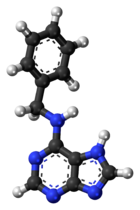Benzyladenine
 |
|
 |
|
| Names | |
|---|---|
|
Systematic IUPAC name
N-(Phenylmethyl)-7H-purin-6-amine
|
|
| Other names
Benzyl adenine; 6-Benzyladenine
|
|
| Identifiers | |
|
3D model (JSmol)
|
|
| ChEBI | |
| ChemSpider | |
| ECHA InfoCard | 100.013.570 |
| KEGG | |
|
PubChem CID
|
|
|
|
|
|
| Properties | |
| C12H11N5 | |
| Molar mass | 225.26 g·mol−1 |
| Appearance | White to off-white powder |
| Hazards | |
| Safety data sheet | External MSDS |
|
Except where otherwise noted, data are given for materials in their standard state (at 25 °C [77 °F], 100 kPa).
|
|
|
|
|
| Infobox references | |
6-Benzylaminopurine, benzyl adenine or BAP is a first-generation synthetic cytokinin that elicits plant growth and development responses, setting blossoms and stimulating fruit richness by stimulating cell division. It is an inhibitor of respiratory kinase in plants, and increases post-harvest life of green vegetables. Influence of cytokinin as 6-benzylaminopurine (BAP) in combination with other methods on postharvest green color retention on broccoli heads and asparagus spears, showed positive results for quality retention. Treatment with 10 and 15 ppm BAP can be used to extend shelf life of fresh-cut broccoli florets and shredded cabbage during storage at 6±1°C at commercial level.
6-Benzylaminopurine was first synthesized and tested in the laboratories of plant physiologist Folke K. Skoog.
...
Wikipedia
